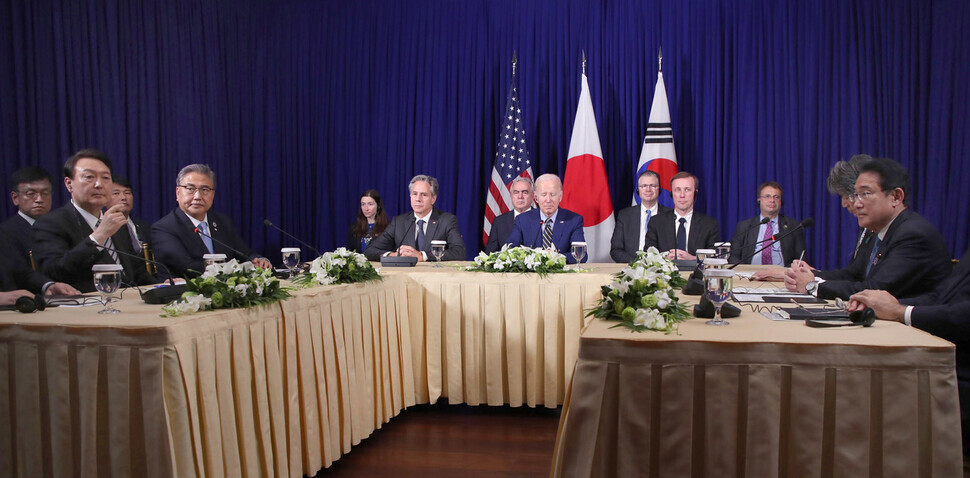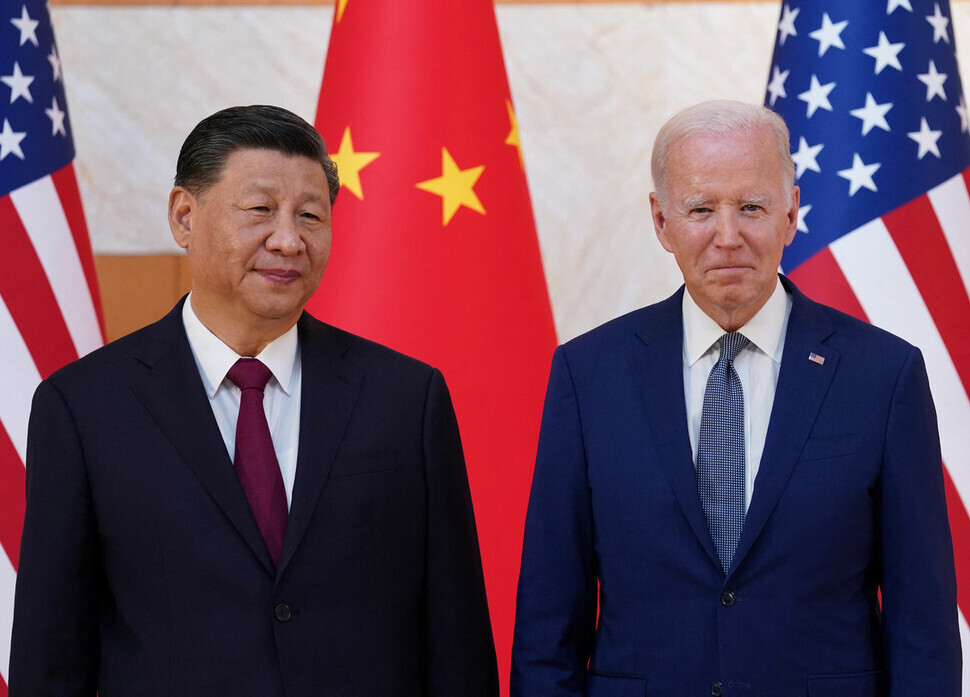hankyoreh
Links to other country sites 다른 나라 사이트 링크
How much will joining US-led alliance with Japan cost S. Korea in defense spending?

With the curtains closed on the G-20 summit, the first large-scale diplomatic event in three years attended by both the US and Chinese leaders, a level-headed assessment has been made on how the consecutive talks held in the past few days will affect each country’s national interests.
In particular, South Korea has taken a decisive step toward solidifying a trilateral alliance with the US and Japan in order to respond to the North Korean nuclear threat and the intensifying US-China rivalry. As a result of this decision, significant domestic issues are expected to arise regarding the pros and cons of this controversial foreign policy direction.
Meanwhile, US President Joe Biden was able to achieve significant diplomatic results during his Asia trip after winning a meaningful victory in the midterm elections on Nov. 8.
Through his first summit meeting with his “old friend” Xi Jinping on Monday, the two sides were able to restore communication lines between Washington and Beijing that had been severed after US House Speaker Nancy Pelosi’s visit to Taiwan in early August.
The US was also able to draw out of China a clear opposition to the use of nuclear weapons by Russia. In other words, the US president laid a basic diplomatic foundation for “responsible competition” with China, which he had been aiming for.
Another important achievement was the Phnom Penh Statement on Trilateral Partnership for the Indo-Pacific, which was announced after the conclusion of the South Korea-US-Japan trilateral summit on Sunday.
Through this statement, Biden succeeded in combining the US’ two major alliances in the Indo-Pacific region, the US-South Korea and US-Japan alliances, into one trilateral alliance involving all three key players.
The statement served as a declaration by the three leaders on their area of cooperation, namely “the Indo-Pacific and beyond.” As such, the regional scope of cooperation has expanded from the original “Korean Peninsula and its surroundings” to include the East China Sea — home to Taiwan — the South China Sea, the Pacific Ocean, and practically the entire world.
In addition, the three leaders declared that they would strengthen solidarity in security and other areas and cooperate in a range of fields, including the economy and technology. In other words, the South Korea-US-Japan trilateral alliance, which will be cooperating on all kinds of issues throughout the world, is making its first moves.
Meanwhile, China’s President Xi Jinping also achieved formidable results.
On Tuesday, one day after the US-China summit, Chinese state-run media emphasized Xi’s major diplomatic victory by stating that Biden had expanded his promise not to adopt a hostile policy against China.”
Xi, who secured a third consecutive term as president at the 20th National Congress of the Chinese Communist Party last month, has been able to avoid extreme confrontation with the US and show that he can withstand US-led multi-pronged attempts at encircling China through strong internal stability.
In other words, China has laid the foundation for its diplomacy through the “Chinese-style modernization” concept that it has been underscoring. In addition, Xi confirmed his presence on the global diplomatic stage by holding bilateral meetings with the leaders of about 10 other major countries.

At the same time, however, China is also being confronted with several significant diplomatic challenges, such as how to respond to South Korea, which is being incorporated in a trilateral alliance with the US and Japan; the troublesome North Korean nuclear issue; and how to keep an appropriate distance from Russia.
South Korea has taken a decisive step toward ending the balanced diplomatic line pursued by the former Moon Jae-in government and is instead, after many years of hesitation, moving toward a trilateral alliance based on values promoted by the US, such as a “rule-based order.”
In particular, regarding the Taiwan issue, which China considers a key national interest, the three countries included a phrase in the Phnom Penh Statement which reiterated “the importance of maintaining peace and stability across the Taiwan Strait.”
After adding this line to the US-Japan summit statement of April 2021, Japan began a series of fully-fledged military build-up efforts to keep China in check. For example, the Japanese government introduced a sharp increase in defense spending, revised three major documents including its national security strategy, and secured the ability to attack enemy bases. In the future, the same response may be demanded from South Korea by the US and Japan.
Clear evidence of South Korea’s “determination” to go in this direction, however, was revealed through the country’s very own independent Indo-Pacific strategy, which Yoon announced during his opening remarks at the South Korea-ASEAN Summit on Nov. 11. The strategy is based on three keywords: freedom, peace and prosperity.
According to Japanese Foreign Ministry documents related to the South Korea-Japan summit held on Nov. 13, Prime Minister Fumio Kishida “welcomed” South Korea’s independent strategy and the two leaders agreed “on aligning their collective efforts in pursuit of a free and open Indo-Pacific.”
However, Yoon was unable to secure a breakthrough in resolving various pending issues with Japan, such as the issue of compensating victims of wartime forced labor. In addition, the South Korean president was also unable to obtain decisive cooperation from Chinese president Xi Jinping to resolve the North Korean nuclear issue during their meeting on Tuesday.
By Gil Yun-hyung, staff reporter
Please direct questions or comments to [english@hani.co.kr]

Editorial・opinion
![[Guest essay] Amending the Constitution is Yoon’s key to leaving office in public’s good graces [Guest essay] Amending the Constitution is Yoon’s key to leaving office in public’s good graces](https://flexible.img.hani.co.kr/flexible/normal/500/300/imgdb/original/2024/0416/8917132552387962.jpg) [Guest essay] Amending the Constitution is Yoon’s key to leaving office in public’s good graces
[Guest essay] Amending the Constitution is Yoon’s key to leaving office in public’s good graces![[Editorial] 10 years on, lessons of Sewol tragedy must never be forgotten [Editorial] 10 years on, lessons of Sewol tragedy must never be forgotten](https://flexible.img.hani.co.kr/flexible/normal/500/300/imgdb/original/2024/0416/8317132536568958.jpg) [Editorial] 10 years on, lessons of Sewol tragedy must never be forgotten
[Editorial] 10 years on, lessons of Sewol tragedy must never be forgotten- [Column] A death blow to Korea’s prosecutor politics
- [Correspondent’s column] The US and the end of Japanese pacifism
- [Guest essay] How Korea turned its trainee doctors into monsters
- [Guest essay] As someone who helped forge Seoul-Moscow ties, their status today troubles me
- [Editorial] Koreans sent a loud and clear message to Yoon
- [Column] In Korea’s midterm elections, it’s time for accountability
- [Guest essay] At only 26, I’ve seen 4 wars in my home of Gaza
- [Column] Syngman Rhee’s bloody legacy in Jeju
Most viewed articles
- 1[Guest essay] Amending the Constitution is Yoon’s key to leaving office in public’s good graces
- 2[Editorial] 10 years on, lessons of Sewol tragedy must never be forgotten
- 3Faith in the power of memory: Why these teens carry yellow ribbons for Sewol
- 4Final search of Sewol hull complete, with 5 victims still missing
- 5[Guest essay] How Korea turned its trainee doctors into monsters
- 6How Samsung’s promises of cutting-edge tech won US semiconductor grants on par with TSMC
- 7Korea ranks among 10 countries going backward on coal power, report shows
- 8Pres. Park an accomplice in ordering resignation of CJ Group vice chairman
- 9[News analysis] Watershed augmentation of US-Japan alliance to put Korea’s diplomacy to the test
- 10K-pop a major contributor to boom in physical album sales worldwide, says IFPI analyst